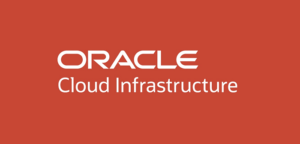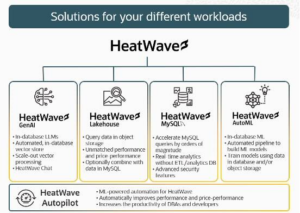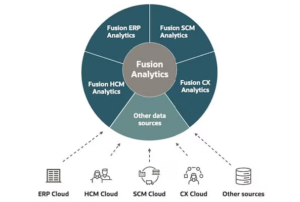Oracle unleashed a torrent of new analytic and AI capabilities this week at its Oracle CloudWorld conference in Las Vegas. The fun kicked off yesterday with an expansion of capabilities in AWS and Google Cloud, updates to Fusion Data Intelligence, as well as new features in its HeatWave lakehouse, GenAI, and AutoML solutions. Then company topped off its CloudWorld news barrage by announcing supercomputer boasting more than 130,000 Nvidia GPUs.
With 131,072 Nvidia Blackwell GPUs delivering a potential of 2.4 zettaFLOPS of peak performance on the Oracle Cloud Infrastructure (OCI) supercluster, Oracle says it’s now taking orders for the world’s largest AI supercomputer.
“We have one of the broadest AI infrastructure offerings and are supporting customers that are running some of the most demanding AI workloads in the cloud,” Mahesh Thiagarajan, OCI executive vice president, said in a press release today.
Customers can order OCI Superclusters equipped with either Nvidia H100 or H200 Tensor Core GPUs, or Blackwell GPUs. Oracle says Superclusters with H100 GPUs can scale up to 16,384 GPUs with up to 65 ExaFLOPS of performance and 13Pb/s of aggregated network throughput, while Superclusters with H200 GPUs will scale to 65,536 GPUs with up to 260 ExaFLOPS of performance and 52Pb/s of aggregated network throughput.
Oracle also updated HeatWave, which it first launched in late 2020 as a fully managed MySQL database for its own Oracle Cloud Infrastructure (OCI) with the capability to house transactional and analytical workloads. Over the years, the company has added additional capabilities, such as integrated machine learning in 2022 and MySQL-based lakehouse capabilities in 2023.
Yesterday, Big Red unveiled several new HeatWave capabilities for AWS, including HeatWave Lakehouse, HeatWave GenAI, and HeatWave Autopilot indexing.
The new HeatWave Lakehouse offering gives Oracle’s AWS customers the capability to leverage Amazon S3 as the backend storage, while using Oracle engines to query structured, semi-structured, and unstructured data.
The new HeatWave GenAI capabilities will give AWS customers the capability to automate the creation of vector stores and vector embedding, as well as to use large language models (LLMs) baked into the database. Alternative, customers can use Amazon Bedrock LLM models, Oracle says.
“This enables AWS users to build rich generative AI applications without the need for AI expertise, without complex manual integrations and troubleshooting, and without the security risks and costs of moving their data to separate services,” Edward Screven, Oracle’s chief corporate architect, said in a press release.
Support for HeatWave Autopilot will let AWS customers create better indexes, while native JavaScript support will let AWS users natively execute stored procedures and functions they have written in JavaScript. All told, Oracle claims the expansion of HeatWave on AWS will allow AWS customers to retire six separate AWS services.
Oracle also made updates to its HeatWave MySQL, HeatWave GenAI, and HeatWave Lakehouse offerings running on OCI.
HeatWave MySQL gains a new “hypergraph” optimizer to improve the cost optimization of query plans; integration with OCI Ops Insights to help admins uncover performance issues, forecast consumption, and capacity plan; and bulk ingest, which will load data up to 5X faster.
Its HeatWave GenAI offering gains features like OCR support; batch processing of LLM inference workloads; automatic vector store updates, support for 27 languages, and JavaScript support.
HeatWave Lakehouse gains support for LLMs that are up to 4x larger than before; new topic modeling capabilities for things like sentiment analysis on social media data; better detection of data drift; and semi-supervised log anomaly detection.
Oracle also used its CloudWorld show to make several announcements around Fusion Data Intelligence, its slate of analytics, ML, and AI capabilities for its enterprise software products, such as ERP and CRM systems.
For instance, Oracle has rolled out a “People Leader Workbench” app for Oracle Cloud HCM that’s designed to help organizations reach their goals. Users of Oracle Cloud SCM (supply chain management) now have a new Supply Chain Command Center app they can use to get recommendations for changing demand, supply, and market conditions.
Oracle owns Siebel, but it’s extending its Fusion Data Intelligence suite to support the rival Salesforce CRM app. Specifically, Oracle is supporting merging data from customers’ Salesforce implementations with other systems within Fusion. Oracle also bolstered its core operational reporting capabilities, as well as added new AI and ML features to analytics for ERP, HCM, SCM, and CX suites.
Finally, Oracle has rolled out a new developer assistant that uses GenAI to help configure Fusion Data Intelligence service, data, and apps.
Oracle also bolstered the partnerships it has with several cloud providers. For its partnership with AWS, the two companies are now supporting Oracle Exadata Database Service running on AWS. They also announced new “seamless” data movement capabilities between the Oracle database to applications running on Amazon EC2, AWS’s analytics services, and even Bedrock.
“We are seeing huge demand from customers that want to use multiple clouds,” Larry Ellison, Oracle co-founder, chairman, and CTO, said in a press release. Ellison delivered a keynote at OpenWorld yesterday, which you can see here.
Oracle is also making headway with its software running in Google Cloud data centers. Specifically, Oracle announced that Exadata, its Oracle Autonomous Database, and its Zero Data Loss Autonomous Recovery Service running on OCI within four Google Cloud datacenters, including .S. East (Ashburn), U.S. West (Salt Lake City), U.K. South (London), and Germany Central (Frankfurt).
“This new service combines all of the benefits of OCI database services with Google Cloud services for a seamless multicloud experience, which was unthinkable in the cloud space just a few years ago,” Karan Batta, senior vice president of OCI, said in a press release.
Related Items:
Oracle Brings Autonomous Database To Microsoft Azure
Oracle Delivers More On-Prem Options for Hybrid Cloud
Oracle Announces GA of MySQL HeatWave Lakehouse
The post Oracle Bolsters Big Data, Analytics, and AI at CloudWorld appeared first on Datanami.



0 Commentaires